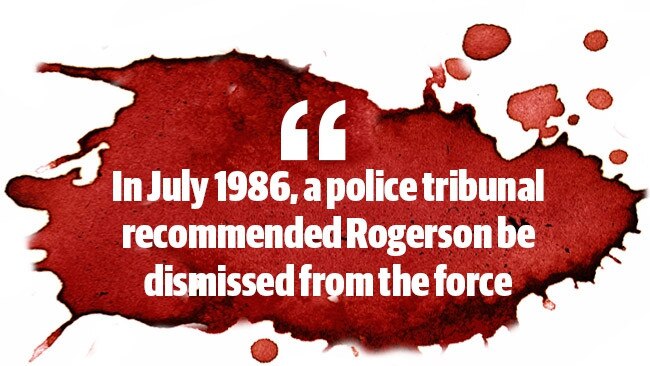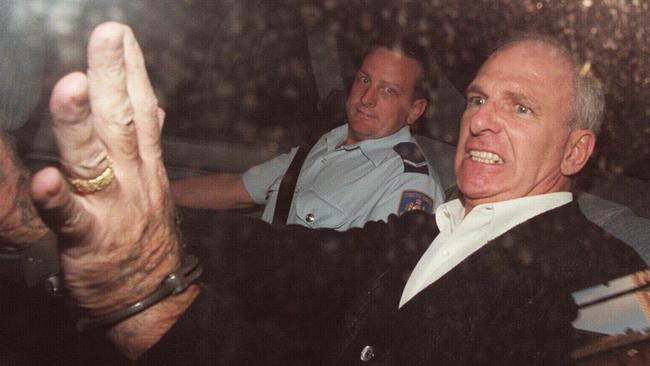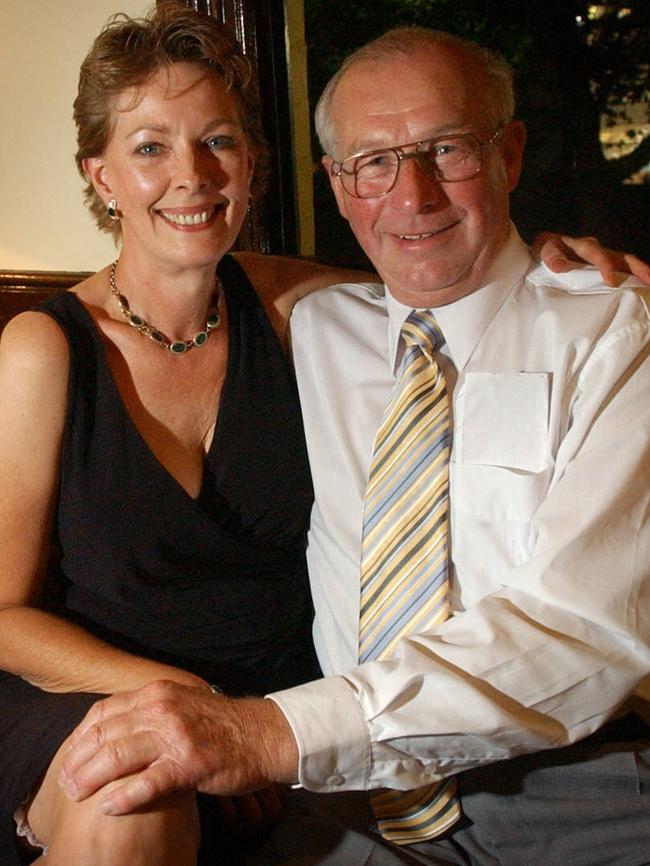AFTER 25 years of locking up and killing some of Sydney’s worst criminals, Roger Rogerson was about to get a taste of life on the other side.
On June 18, 1985 the Detective Sergeant spent his first night in a NSW jail.
He had been convicted of conspiring to deal heroin with Dennis Allen, also known as Dr Death.
Allen was a psychopath and considered one of the most evil men in Australian criminal history.
He killed and dismembered people just for fun.
The conviction made even Rogerson’s staunchest supporters shudder to think about the company he was keeping.
The Dirty Harry’ image was slipping to just plain “Dirty”, yet he didn’t seem worried.
After one night in the cell he was released pending an appeal. As was his habit, he won.
In the 80s, Rogerson was teflon.
On top the charges he beat involving police officer Mick Drury, he also beat assault charges he assaulted the female owner of a Korean restaurant at a wild farewell for the NSW police Olympic team.

Nothing — especially the courts — seemed able to stop him.
Resuming his duties, Rogerson got a healthy amount of back but was ordered to work at Bankstown as uniformed officer.
It was a massive blow to his ego.
Armed with a medical certificate saying he was suffering from depression, Rogerson went on extended sick leave.
He would never wear a police uniform again.
At the time, talk started circulating about an internal power struggle within Sydney police between two factions known as the White knights led by Police Commissioner Jack Avery and the Black Knights with Rogerson as the leader.
Serious fears were held for the safety of a number of senior police, including the head of Internal Affairs and Assistant Commissioner Bob Shepard.
Shepard said publicly the NSW police force was the “most corrupt in the world”.
Rogerson was as cocky as ever and believed he would win out against the new regime.
All his career his actions had been sanctioned from above.
But what he underestimated was Avery’s determination and his waning power base.
The head of the CIB and Rogerson’s guardian angel inside the force, Noel Morey, had retired.
Yet, with friends in the media and his unwavering belief in his ability to charm people, Rogerson went on the offensive.
Just weeks after the body of Sally-Anne Huckstepp was found dead, Rogerson gave an interview to Ray Martin on Channel Nine.
It was April 1, 1986 and Rogerson came out all guns blazing.
He said he didn’t believe any NSW cops were corrupt — except Drury.
Then, amazingly, he named Arthur Neddy Smith as one of his informants.
It publicly outed Smith as a “dog’’, a tag which could be fatal in the underworld.
From that day Rogerson and Smith’s relationship deteriorated.
He also mentioned Lennie McPherson as a person he often spoke to.
Within 24 hours the ramifications of Rogerson’s TV appearance were as sensational as his accusations and revelations.

As a result of naming an informant and an ongoing operation into bank accounts he had opened up under a false name, Rogerson was hit with a raft of departmental charges.
This included police misconduct and his improper relationship with Smith.
The noose was tightening.
In July 1986, a police tribunal recommended Rogerson be dismissed from the force.
The next year Smith, after a massive drinking binge, stabbed to death a tow truck driver in Coogee after they got in a fight over a car accident.
Although their relationship was strained and Rogerson was no longer in the force he was asked to get Smith to give himself up.
Smith was eventually sentenced to life in imprisonment for the murder.
The pair, who had formed such a formidable criminal duo, were done.
They would soon became sworn enemies with Smith ratting on his mate several times at various inquiries into police corruption.
In 1990, Rogerson’s luck with the courts finally ran out and he was jailed after being convicted of perverting the course of justice for depositing $110,000 in a bank account under a false name.
He claimed the money was from the sale of a Bentley car he had restored.
Others suspected it was from a drug deal.
He spent nine months in jail but was released while the case went to the Court of Appeals.
His freedom was short lived when the appeal was dismissed and he was sent back to jail for three years.
It was also around this time his child hood sweetheart and mother of his two daughters left him.
She changed her name and has never spoken publicly about her life with Rogerson.
Ten years later he was back in the clink after lying to the 1999 Police Integrity Commission.
He spend a year behind bars from over 2005/06.
Rogerson’s stints in jail actually meant his notoriety flourished. And he made the best of it.
He opened a scaffolding business after learning to weld while in Berrima jail.
However, even a straightforward business ended up murky.
Rogerson was picked up on phone taps asking his wife to destroy invoices.
In 2006 he was facing charges in South Australia for attempting to get a police officer to use his computer to access the address of person facing NSW civil court.
The evidence was gathered from the Australian Crime commission bugging his phone.
In between his jail stints, Rogerson married Anne Melloco — who he was living with her at the time of his latest arrest.
After his incarceration he started to associate more openly with criminals.
His second wedding was attended by a few colourful identities, including well known bikie Arthur Loveday.


Another good mate was former cop turned Bandito sergeant at arms Ray “Chopper” Johnson.
He was good mates with Melbourne criminal identity Mick Gatto, often caught up with Sydney businessman Jim Byrnes and would have the odd coffee with John Ibriham.
He even went on the road doing stand-up shows with criminal Mark “Chopper” Read.
With his never ending supply of charm his public appearances saw a resurrection of his persona as a hard bastard copper that got the job done.
The shows were incredibly popular, with Rogerson talking about killing men in the line of duty and how the NSW police force was the best money could buy.
He loved to deride the modern force and talk about the legendary good old days.
He would sign copies of the “Notice of Death’’ form he had to submit to the Coroner after he killed Warren Lanfranchi.
He had pens made in the shape of bullets with the names of all three men he claimed to kill in the line of duty.
He also wrote a book.
It was a total whitewash of his life. He had also blogged for the Daily Telegraph when the Underbelly TV series aired.
Roger was in demand and loving it.
But, as always, he couldn’t stay away from evil.
Smith was attacked by a small time gangster and boxer named Terry Ball.
Soon after, Ball was fatally shot.

Mapped: How Sydney has been rocked by a wave of shootings
From terrified toddlers to innocent lives lost, Sydney’s suburbs have been rocked by 14 drive-by shootings in just three months — with police warning some attacks were cases of mistaken identity.
Who Owns Tassie’s farms: Biggest investors, landholders named
An annual investigation can reveal Tasmania has been a key destination for capital in the race to invest in Aussie agriculture. See the full list.